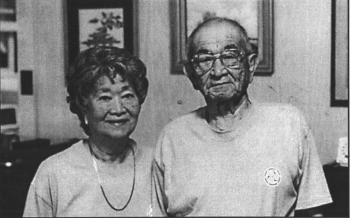Ronald and May Goya

Tsunamis Remembered: Oral Histories of Survivors and Observers in Hawai‘i
Life history interviews with individuals who witnessed and survived tsunamis-particularly the 1946 and 1960 disasters on the Big Island of Hawai'i. Thirty individuals-mostly residents of Hilo and Laupahoehoe-recall their experiences before; during, and after the 1946 and 1960 tsunamis which were arguably the most destructive natural disasters in modem Hawaiian history.
Ronald "Square" Goya, one of three children, was born to Okinawan inunigrants, Ushi "Haru" and Aizo Goya, on September 19, 1911. His father, originally from Okinawa, worked first as a plantation worker on the Big Island. After moving to Hilo his father drove a hackney then a taxicab; he later operated a grocery, liquor store, U-Drive, and service station. Born in the Waiakea section but raised in the Shinmachi section of Hilo, he attended Waiakea Kai, Kapi'olani, Hilo Intermediate, and Hilo High schools. He graduated from Hilo High School in 1934. Six years later, he married May Yaeko Toyama. May Goya was born to Okinawan immigrants, Tsuru Osato Toyama and Zenshin Toyama, on May 21, 1920 on the island of O'ahu. One of ten children, May Goya worked for two years at a dress shop in downtown Honolulu following her graduation from McKinley High School in 1938. After marrying into the Goya family and moving to Hilo, she helped at the Goyas' stores and service station. Following the 1946 tsunami in Hilo the Goyas closed the grocery store and opened May's Fountain, noted for its hospitality, loco moco and "Volcano Special" sundae. In 1960, May's Fountain and the Goya's service station were destroyed by the tsunami. The Goyas then opened a hot plate-lunch establishment on Ponahawai Street. They retired in 1977. Square and May Goya raised three children and have three grandchildren. They were interviewed simultaneously in their Hilo home.
Scope and Content Note
Ronald "Square" Goya is a Hilo native remembers his parents and growing up in Shinmachi. He recalls his family's service station/grocery store. His arranged marriage and long-distance engagement are also discussed. Includes effects of World War II on the Big Island: martial law, rationing, blackouts, and military presence. Describes fountain business and loco moco and volcano sundae specialties. The 1946 and 1960 tsunamis are remembered, including eye-witness accounts, damages, and long-term impact.
May Goya recalls growing up in Waikiki with her parents and large family, McKinley High School activities, and work as a mother's helper/housekeeper. She talks about her arranged marriage, wedding, and new life with in-laws. Includes effects of World War II on the Big Island: martial law, rationing, blackouts, and military presence. Describes fountain business and loco moco and volcano sundae specialties. The 1946 and 1960 tsunamis are discussed, including eye-witness accounts, damages, and long-term impact. Interviewed with Ronald Square Goya.
Program Note:
This interview is part of the Center for Oral History's project Tsunamis Remembered: Oral Histories of Survivors and Observers in Hawai‘i. Interviews from this project are available in the Center's ScholarSpace open access repository.
The Center for Oral History (COH), in the Department of Ethnic Studies at the University of Hawaiʻi at Mānoa, collects, documents, preserves and highlights the recollections of Native Hawaiians and the multi-ethnic people of Hawaiʻi. It produces oral histories and interpretive historical materials about lifeways, key historic events, social movements and Hawaiʻi’s role in the globalizing world, for the widest possible use.
Please Note: The oral histories in this collection are protected by copyright and have been created for educational, research and personal use as described by the Fair Use Doctrine in the U.S. Copyright law. Please reach out Voices@noaa.gov to let us know how these interviews are being used in your research, project, exhibit, etc. The Voices staff can help provide other useful resources related to your inquiry.
The NOAA mission is to understand and predict changes in climate, weather, oceans, and coasts, to share that knowledge and information with others, and to conserve and manage coastal and marine ecosystems and resources. The Voices Oral History Archives offers public access to a wide range of accounts, including historical materials that are products of their particular times, and may contain offensive language or negative stereotypes.
Voices Oral History Archives does not verify the accuracy of materials submitted to us. The opinions expressed in the interviews are those of the interviewee only. The interviews here have been made available to the public only after the interviewer has confirmed that they have obtained consent.
